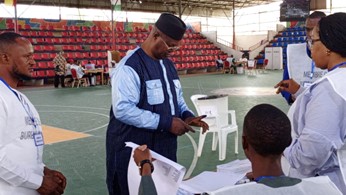The Guinean diaspora in Liberia participated in a crucial constitutional referendum held concurrently in their home country on September 21, 2025. This landmark vote aimed to reshape Guinea’s political landscape by potentially ushering in a new constitution drafted by the National Transition Council. Facilitated by the collaborative efforts of the Guinean Embassy in Liberia and the Liberian National Elections Commission (NEC), the referendum saw hundreds of Guinean nationals gather at the Samuel K. Doe Basketball Gymnasium in Monrovia to cast their ballots. The event underscored the strong ties between the two nations and the commitment of the Liberian government to supporting democratic processes within the region.
The groundwork for the referendum in Liberia was laid through diplomatic channels and inter-agency cooperation. Guinean Ambassador to Liberia, Aboubacar Sylla, formally requested electoral support from Liberia’s NEC, a request that was readily granted. The NEC provided essential voting materials, including ballot boxes and booths, enabling the smooth execution of the voting process for Guinean citizens residing in Liberia. This assistance not only facilitated the referendum but also symbolized the spirit of collaboration and mutual respect between the two countries. The Liberian National Police also played a crucial role, ensuring the security and peaceful conduct of the referendum.
The proposed constitution at the heart of the referendum introduces several key changes with potentially far-reaching implications for Guinea’s political future. Among the most significant revisions are provisions enabling members of the military junta, including the current leader, General Doumbouya, to participate in future elections. This has sparked debate, with supporters viewing it as a pragmatic step towards normalized political participation and critics raising concerns about potential power consolidation by the junta. Other notable reforms include an extension of the presidential term from five to seven years, with the possibility of two re-elections, and the establishment of a Senate with some members directly appointed by the president.
The extension of the presidential term and the method of Senate appointment have further fueled the controversy surrounding the referendum. While proponents argue that a longer presidential term provides stability and continuity, critics fear it could entrench incumbent power and stifle democratic transitions. Similarly, the presidential appointment of some senators raises concerns about the balance of power and the potential for executive overreach. These proposed changes have polarized public opinion within Guinea, with passionate arguments being made on both sides of the issue.
The Guinean Ambassador to Liberia expressed profound gratitude for the support provided by the Liberian government and its various agencies in facilitating the smooth conduct of the referendum. He particularly acknowledged the crucial role played by the NEC, the Ministry of Foreign Affairs, and the Liberian National Police in ensuring a secure and transparent voting process. The ambassador also praised the enthusiastic participation of the Guinean community in Liberia, interpreting their high turnout as a testament to their commitment to shaping their nation’s future. The successful execution of the referendum in Liberia, facilitated by the collaborative efforts of both nations, demonstrated the strength of their bilateral relations and their shared commitment to democratic values.
The referendum’s outcome remains uncertain, with a minimum participation rate of 50% of Guinea’s eligible voters required for its validation. Whether the proposed constitutional changes are ultimately adopted will significantly impact Guinea’s political trajectory and the country’s path toward democratic governance. The international community will be closely monitoring the developments following the referendum and its potential impact on stability within the region. The collaboration between Guinea and Liberia in facilitating the diaspora vote serves as a positive example of regional cooperation and the promotion of democratic participation.














